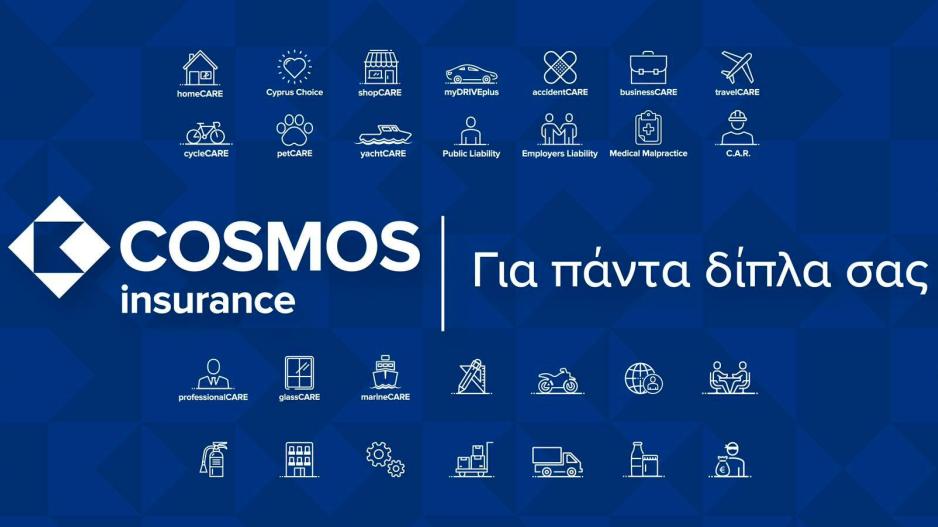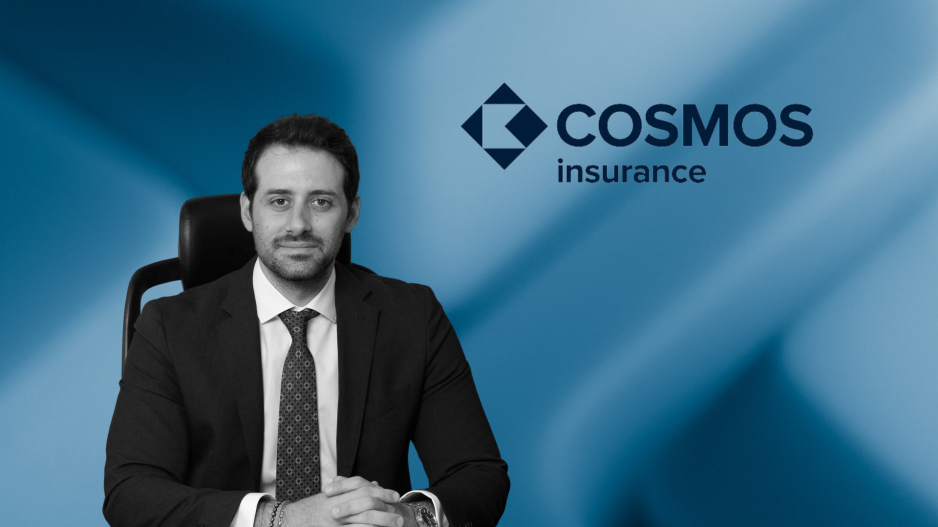Leading Through Change: Kyriakos Tyllis Talks Strategy and Success
Cosmos Insurance CEO Speaks to FastForward About the Evolution of the Company, Leadership Principles, and Adapting to Market Trends
Founded in 1981, Cosmos Insurance has navigated the complexities of the insurance sector with a forward thinking approach, evolving from a small family-owned business to a major player in the industry. Over the decades, the company has embraced technological advancements, broadened its insurance offerings to include property and liabilities, and successfully transitioned to a public entity listed on the local stock market.
In this insightful interview with Kyriakos Tyllis, the CEO of Cosmos Insurance, we delve into a range of topics that highlight both the challenges and strategies integral to the company's success. Mr. Tyllis shares his experiences and the foundational leadership principles that guide his approach to managing one of the largest insurance companies on the island. From discussing the company's adaptation to meet changing client demands to exploring broader industry trends such as digital transformation and the impacts of climate change, this interview offers a comprehensive look at the strategic visions that drive Cosmos Insurance.

Cosmos began its operations in 1981 by the visionary Kyriakos M. Tyllis. The company was back then a small family-owned insurance company insuring almost solely motor vehicles. As time passed by and private insurance became more widespread, the company started building cooperation with more insurance intermediaries, offering cover for other lines of business such as property and liabilities and developing a bigger portfolio. In 2000, the company went public, with its shares being listed on the local stock market. From that point onwards the company evolved from a small family business to one of the large non-bank affiliated insurance companies of the island.
A main driver to its evolution is the continuous investment in technology, the constant training of employees and agents, the development of new insurance solutions that follow the constantly changing client demands and of course the consistency at quality service.
Successfully guiding an insurance company requires a blend of traditional leadership principles and industry-specific knowledge. Probably the most important in my opinion, is having a clear Strategic Vision for the company's future. This includes areas such its position in the market, target customer segments, short term and long-term goals that are achievable and realistic. This vision should guide decision-making at all levels and inspire employees.
Communicating this vision and company goals to employees and key stakeholders is crucial as each member of the team plays an important role in the organization, each in its own way. Therefore, open, honest, and transparent communication is embedded in our corporate values as it builds trust and strong relationships.
Probably the most important in my opinion, is having a clear Strategic Vision for the company's future... This vision should guide decision-making at all levels and inspire employees
Good Risk Management is also essential. Understanding and effectively managing the diverse risks inherent in the insurance business is of utmost importance. Having a robust risk management framework safeguards the company's financial stability. In a fast-changing environment like the one we live in, adaptability is crucial. Being able to anticipate and respond effectively to market disruptions, economic fluctuations, and regulatory changes, safeguards smooth operation and of course makes the most of new opportunities.
Another key area of focus for our company has always been the focus on the customer. We are committed to understanding customer needs and delivering value-added products and services. For us, customer satisfaction, retention, and loyalty are important, and this extends to our cooperation with insurance intermediaries who we consider our primary «clients». This is why we place a high importance on honest feedback, since we believe it’s the best way to improve and evolve. This is also the main driver behind all the technological enhancements that are constantly being implemented that aim at offering a slick customer experience to our agency network and clients.
There are several trends shaping the insurance industry, not only on a local but on a global level. Probably the main one that affects the local market in a more indirect way is climate change and how companies can and must adapt to this changing environment. Extreme events such as storms, hail, floods, earthquakes etc. occur more frequently and with higher intensity, destroying homes and businesses worldwide. This results in higher amounts being paid in compensation and as a result an increase in claims costs for insurers and reinsurers. Due to Cyprus’s geographical position, we may not experience the direct impact of extreme weather conditions the same way some other countries are experiencing but definitely has an impact on the industry in various ways. For example, it increases costs due to the higher reinsurance rates and consequently the increased cost in buying sufficient reinsurance protection. This leads to making some risks unaffordable for the consumer or unattractive for the insurance company.
Digital transformation is also at the top of market trends as technology is advancing at a very fast pace and that impacts customer expectations. Today’s clients are changing, seeking seamless digital experiences and personalized service more than ever.
Artificial intelligence, machine learning and data analytics are necessary investments for those who want to enhance operational efficiency, customer experience, and product innovation. This is not cheap to achieve as talent is hard to find, and when found is expensive to retain, and at the same time, the investment necessary to accommodate all this is quite costly.
The cost of repairing a damaged vehicle is approximately 15% higher than it was a couple of years ago and the cost of rebuilding a property around 30% higher
Inflation is also a top trend in insurance. Prices have risen significantly with insurers seeing an increase in claims costs. To give an example, the cost of repairing a damaged vehicle is approximately 15% higher than it was a couple of years ago and the cost of rebuilding a property around 30% higher. These increases put pressure on insurers to balance their pricing at a reasonable level without putting their profitability at risk.
Another area of interest is the evolution of risks. Cyber risk for example is a risk that businesses will have to consider when planning their future strategies and this creates new risk areas for insurers to focus on. Additionally, the development of electronic and automated vehicles. Cyprus is not following the development at the same pace as Europe or the USA either in infrastructure or sales and therefore local insurers face a lot of uncertainties when it comes to assessing these types of risks due to smaller volumes and lack of historical data.
The past year was indeed a good year for Cosmos. We closed the year with profitability from insurance operations, which was our primary goal. This is the result of team effort as all departments work with the same goal in mind, which is none other than the good performance of the organisation. Since the year 2020, the company has gone through various changes, both at strategic and commercial level. Some of these decisions weren’t always easy to take but were taken with the aim of achieving a healthy and balanced portfolio that will allow the company to grow and become one of the key market players. The results leave a very satisfying feeling because it is proof that the decisions made were the correct ones.
For the future, the strategy remains the same. We aim for steady and healthy business growth with the primary goal being maximizing the value of the Company for all stakeholders.
As also previously mentioned, climate change impacts in various ways. The most significant impact comes from how the global reinsurance markets react to climate change. If specific areas are considered as high-risk areas for reinsurers, then coverage will not be available to purchase at reasonable rates and that will probably lead to insurance companies being unable to offer solutions for those types of risks.
This becomes even more challenging in cases where some reinsurance markets consider specific areas as “red flags” and decide to completely withdraw. This causes a capacity problem in the market that prohibits local companies from offering insurance to their clients due to the lack of proper reinsurance support.
Companies need to carefully analyze their database to identify areas of low and high impact on their performance and adapt their services accordingly
Having this in mind, companies need to carefully analyze their database to identify areas of low and high impact on their performance and adapt their services accordingly.
For example, a safe approach would be to focus on building a strong and solid portfolio of low risks that will cost less in terms of capital adequacy. This can also lead to an ESG way of thinking in which by incorporating ESG considerations into insurance products, companies can not only manage their own risks more effectively but also contribute to positive social and environmental outcomes. For example, Insurers can integrate ESG factors into their risk assessment to better understand and quantify risks related to climate change (amongst other ESG-related considerations). This can help companies price policies more accurately and manage their exposure to ESG risks more effectively as well as enhance their product design by rewarding policyholders with lower premiums for using sustainable materials in construction, driving hybrid or electric vehicles, or implementing safety measures that benefit the community.
It is true that there is a strong family history in the local insurance industry that goes back generations. However, I would not say that the company should be seen as a family enterprise. Cosmos may have started as a family company but since the year 2000 it has converted to a Public Listed Entity, a status that holds to this day. This bears a big responsibility to the people sitting at the top of the corporate pyramid because there is a duty to perform well and in utmost transparency. Therefore, proper and strong corporate governance is key and an area of great importance.
Being the head of such an entity and having the family name bears even more responsibility as it implies a constant effort to perform well and avoid being accused of “inheriting” the position.







